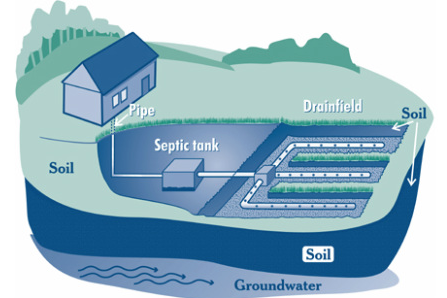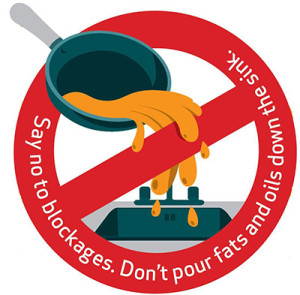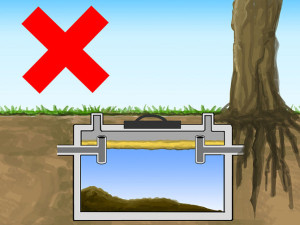Recommendations for Properly Maintaining Your Septic System
- Locate the original state approved septic design for the system installed. This can be obtained from your local town office or city hall or from NH DES or the State of Vermont.
- Know where your septic system is located and do not build any decks or other structures over any part of the system.
- Have your septic tank cleaned on a regular basis.
- If a filter is installed in your septic tank, make sure to clean it at least annually.
- If you have a garbage disposal, the system should be designed to handle it. If it is not, we recommend discontinuing the use or removal of the disposal.
- DO NOT overuse the system design. If bedrooms are added beyond what the system is designed to handle it can lead to premature failure and/or costly repairs to the septic system.
- Don't treat your septic system like a trash can. Do Not Flush: Paper products (aside from toilet paper), fat, grease or oils, disposable diapers or baby wipes (even if they say 'flushable'), cat litter, feminine hygiene products, condoms, cigarette butts, paints and varnishes, pesticides, acids, food scraps, medications, bleach or harsh chemicals, cotton swabs and coffee grounds.
Inside the House
- Repair fixture leaks; even the smallest drip can damage your septic system.
- No more than two (2) loads of laundry back-to-back in a day.
- Do not pour grease and oils down the drains.
- You do NOT need to add any commercial products to your septic system. The only bacteria your septic system needs is what comes from your digestive system. Additives can damage your septic system by destroying the good bacteria and breaking up the sludge and scum layers, allowing them to flow to the leach field. Additives that say "You never have to pump your septic tank again" are the worst!
Outside the House
- Direct down spouts and runoff away from the septic field to avoid saturating the area with excess water.
- Dense grass cover and other shallow rooted plants are beneficial over a septic field. Do not plant trees because large plant roots can clog or break the pipes.
- Avoid compacting the soil over the leach field area. Do not drive or park vehicles over the area. Do not build a shed, deck or driveway in this area. Do not plow snow over your leach field.
Septic System 101
- Don't wait until your system shows signs of failure before you have your septic tank cleaned out. Recommended tank cleaning every 1 - 3 years depending on size of tank and usage.
- Septic systems generally give little warning that they are about to fail. The following symptoms often indicate the leach field is becoming clogged: >sewage odor near the septic tank or leach field, >slowly running drains and toilets (especially lower level), >sewage on the ground over leach field area (soggy area when mowing).
- Keep your septic tank cover accessible to tank cleaning and inspection. If the tank is located more than 12 inches underground we highly recommend adding a riser for easier accessibility.
- Don't attempt to repair a failing system yourself. Hire an experienced septic contractor.
- NEVER ENTER A SEPTIC TANK. Toxic and explosive gases in the tank present a hazard. Old tank can collapse. Secure the septic tank lid so children cannot open it.



